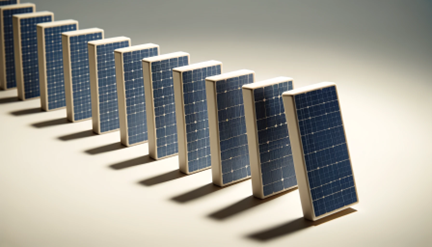Tariffs on solar glass are hurting the European solar industry. This problem can now be easily solved without endangering European solar glass production.
We are confronted with an absurd situation. To protect the very small European solar glass industry, the European Commission introduced import tariffs on solar glass many years ago. These tariffs ensure that European module manufacturers are no longer competitive, despite the fact that they can purchase very cheap solar cells from China for their modules. Some module manufacturers have reduced working hours. Meyer Burger has halted module production and currently several thousand jobs are at stake.
So tariffs are harmful. But what is the absurd response? To protect module manufacturers, there are recurring considerations for imposing tariffs across Europe on imports of Chinese modules. A vicious circle! This would jeopardize hundreds of thousands of jobs in the European solar energy sector and save a few hundred jobs in the small solar glass industry.
So far, the reintroduction of tariffs on modules has been prevented. Because tariffs on Chinese modules would be a disaster for climate protection in Europe, and that is why the European Commission has rightly hesitated so far. However, the situation remains difficult for European module manufacturers.
Now there’s a very simple way out of this tariff spiral: the Net-Zero Industry Act (NZIA). This prescribes resilience and sustainability criteria for some of the tenders.
The traffic light coalition in Germany has just decided in the context of the consultation on the solar package that NZIA must be implemented as quickly as possible. What does this mean? Before the German federal government can present a draft law, it must wait for the European Commission’s implementing law, which is expected at the end of this year. The legislative process will therefore start in the first half of 2025. Its entry into force is expected in the second half of the year. Afterwards, the resilience tenders will also be issued.
It can be assumed that solar glass will also be part of the privileged European value chain according to NZIA. This will secure the future of the very small European solar glass production, which can only cover a very small part of European demand. Double security via solar glass rates is no longer necessary. The tariffs for solar glass can and should therefore be abolished in parallel with the introduction of resilience tenders.
With the abolition of solar glass tariffs, the competitiveness of European module manufacturers will increase dramatically; this will especially apply to glass-glass modules. Here, tariff costs had a double impact.
Moreover, in the future, European modules will also be secured via resilience tenders. The module manufacturers can not only produce much cheaper with more affordable solar glass, but also have the NZIA safety net. All discussions about tariffs on the import of modules should now be off the table.
The step-by-step plan is now clear. Now it is about breaking the vicious circle of the past and abolishing artificially increased costs for European manufacturers. In this way, resilience and climate protection can be linked.
The views and opinions expressed in this article are those of the author and do not necessarily reflect those of the author pv magazine.
This content is copyrighted and may not be reused. If you would like to collaborate with us and reuse some of our content, please contact: editors@pv-magazine.com.


